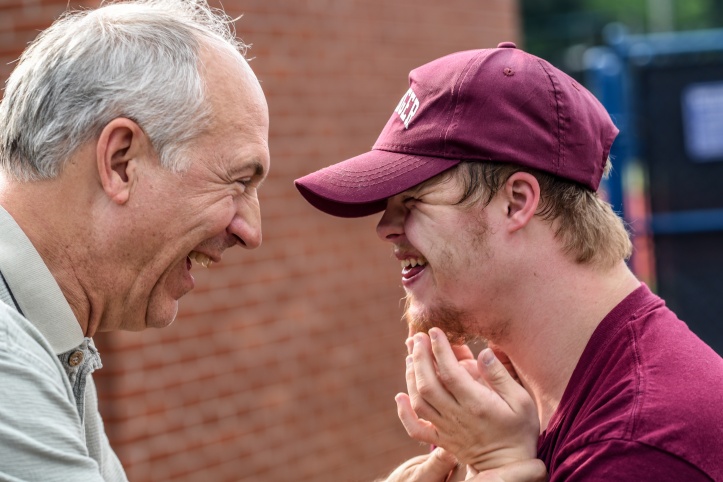Joyful. My personal specialty in life, informed by academic studies in biology, leadership, psychology, counseling, and theology, is to study what makes people most healthy and joyful. I’m blogging on what research I’ve stumbled upon in my reading about this, and offering suggestions for ways we might try to improve our day. I offer them for your thoughtful review…
Great Day Suggestion #4. Live life! And do it with an intentional, positive attitude.

We noted earlier that Benjamin Franklin wrote down his morning routine for us:
- Rise and wash.
- Address God with thanksgiving for His Powerful Goodness.
- Ask the question, “What good shall I do this day?”
- Prosecute the present study, and breakfast.
His attitude reflects an expectation: “What good shall I do this day?” Franklin started each day believing that he was going to be in the middle of good things happening. He was going to look for them. He was going to participate in them. He was going to do good.
Do you believe this? That you will make a positive impact today? That good is just ahead? That you can accomplish good today?
Often, we feel as if “positive feelings and attitude” are the results of achievement or accomplishment. We win a game or an award, and so we feel good. We have a positive experience with a neighbor, we get a better job, we feel deeply loved—and this makes us feel positive about life. We make “goodness” or “happiness” an end-result of achieving some goal. And sometimes, it is. But more often, a positive attitude can be the spark that makes good things happen. Having a positive attitude—a choice, really—is essential to building the skills that allow for success. In other words, happiness is also the precursor to success, not just the result.
You have to begin today by believing that good will happen, or it probably never will.
Research by Dr. B. L. Fredrickson shows that, “people’s daily experiences of positive emotions compound over time to build a variety of consequential personal resources.” She calls this the Broaden and Build Theory, asserting that positive attitude builds on itself, and creates more positive attitude, and eventually broadens and builds into tangible positive results. Researchers have often noticed a compounding effect or an “upward spiral” that occurs with positive people. They choose to be positive, so they develop new skills, those skills lead to new success, which results in more happiness, and the process repeats itself.
Fredrickson tested the impact of positive emotions on the brain by setting up a little experiment. During this experiment, she divided her research subjects into five groups and showed each group different film clips. The first two groups were shown clips that created positive emotions, like joy and contentment. Group 3 was the control group, seeing images that were neutral.The last two groups were shown clips that created negative emotions. Group 4 saw images that created feelings of fear. Group 5 saw images that created feelings of anger.
Afterward, each participant was asked to imagine themselves in a situation where similar feelings would arise and to write down what they would do. Each participant was handed a piece of paper with 20 blank lines that started with the phrase, “I would like to…”
Participants who saw images of fear and anger wrote down the fewest responses. Meanwhile, the participants who saw images of joy and contentment, wrote down a significantly higher number of actions that they would take, even when compared to the neutral group. Negative emotions reduced a subject’s possibility of action, while positive emotions increased the number of possibilities available to that person.
So what does this mean? Simply put, when a person experiences positive emotions like joy, contentment, and love, they will begin to see more possibilities in life. These findings were among the first that suggested positive emotions broaden your sense of possibility and open your mind up to more options. The benefits of positive emotions don’t stop after a few minutes of good feelings, either. Research proves that choosing and seeking positive emotions enhances our ability to achieve positive results and overcome negative struggles. Positive emotions open our minds, which in turn allows our days to be more easily filled with good things. I have a friend who always chimes to any struggle, “100%!” He believes that amazing, good things are possible all the time.
You have to begin today by believing that good will happen, or it probably never will.
“The greatest discovery of any generation is that a human can alter his life by altering his attitude.” – Psychologist William James

Duke University found that, in a study of 3,000 heart patients (all of whom were suffering from the same degree of illness), those who had a positive altitude were 300 percent less likely to die within three years than those who had a poor attitude. In a study of more than 5,000 people over the age of 65, researchers at Johns Hopkins University found that a poor image of one’s health–regardless of other risk factors–roughly doubled the risk of death within five years. In fact, a pessimistic outlook proved to be deadlier than congestive heart failure or smoking 50 or more packs of cigarettes every year.
You have to begin today by believing that good will happen, or it probably never will.
HOW do we do this?
Practically, then, how do we increase our positive attitude and feelings, so that we can take advantage of the “broaden and build” theory in our life?
Well, research shows that anything that sparks feelings of joy, contentment, and love will do the trick. According to Rick Hanson, neuropsychologist and author of Hardwiring Happiness,
“People don’t recognize the hidden power of everyday experiences…We’re surrounded by opportunities — 10 seconds here or 20 seconds there — to just register useful experiences and learn from them. People don’t do that when they could.”
What makes you smile, or joyful, or at peace? You probably know what things work well for you. Maybe it’s playing the guitar. Maybe it’s spending time with a special person. A good cup of tea. Fresh cut flowers in a stone vase. A pick up basketball game. Fifteen minutes in a good book. Sorting the cans of vegetables in your pantry into O-C rows. Rubbing your child’s back. Carving wooden shoes. Maybe it just takes 5 minutes in the garden to put a smile in your soul. In one study, fresh outdoor air improved the mood of over 95% of people. According to field studies by Kuo and Coley at the Human-Environment Research Lab, time spent in nature connects us to each other and the larger world. I often listen quietly to a favorite song or two in the hot tub, just as the sun begins to invade my back yard. Warmth, fresh air, and joy, together!
Maybe you find something positive in writing or journaling. A recent study published in the Journal of Research in Personality noted that students who wrote down positive experiences or hopes for a day had better mood levels, fewer visits to the health center, and experienced fewer illnesses—and the positive results lasted for over three months!
So, try it! Engage life positively! Not long after waking, walk to the door (front or back) and open it. For one minute, breathe real air, unheated or conditioned. Stand on the stoop or porch or balcony and breath in. Breath out. Breathe in. LIVE. Is it snowing?—feel the cold air on your ears, the concrete drawing heat from your feet. LIVE. Is it sunny?—let the sunshine rest on closed lids for a moment. Just another overcast day? Nonsense! Feel the air moving. Listen to the sounds around you. Be alive. And ask “What good shall I do today?” Then go offer a hug to someone, or at least jump on their bed.
You have to begin today by believing that good will happen, or it probably never will.
Give yourself permission to smile and enjoy the benefits of positive emotion. Seek joy, schedule time for play and adventure, and expect God to do something special today. Seek out to experience life more fully, with contentment and happiness. Seek joy, play often, and pursue adventure. Your brain will do the rest.
Life is a biological function. Living well is a consecrated choice.
Great day suggestions so far:
1. Start the morning the night before: mis-en-place. More on that here.
2. Get up when the alarm rings the first time. More on that here.
3. Skip the electronic media in the morning. Period. More here.
4. Live today! And do it with an intentional, positive attitude.
Tomorrow: The science around prayer.

Author’s Source note: As a blog, not a research paper, I am not footnoting sources. Still, I’ve drawn from many reading sources on wellness and productivity to build the blog data for this series, including Psychology Today, HuffPost, Hope and Optimism, The Wall Street Journal, OpenBuffer, Forbes Magazine, Applied Psychology, Personality and Individual Differences, Harvard Business Review, and the National Institute of Health.
Thanks Pastor Brad! You’re such a wise, Godly, interesting, witty and surprising guy to “sit under”. May God continue to bless our church family through you for many years to come while keeping your head and heart and in good order no matter how much “fan mail” you get! Supporting you and yours in prayer always, Eva R.
Brother Brad, You do well when you seek to lift the spirits of your brothers and sisters. When you inspire them with words of life. As Jesus is the Word, ALL good, real, truthful words are a part of him. You are imparting Jesus to this world. Let all those who have ears to hear, do so, to the glory of God the Father. And thank you for what you are doing. It is good work!
Thanks, Richard. My hope is to encourage and strengthen people, without dumping on them judgment.
Good work indeed.